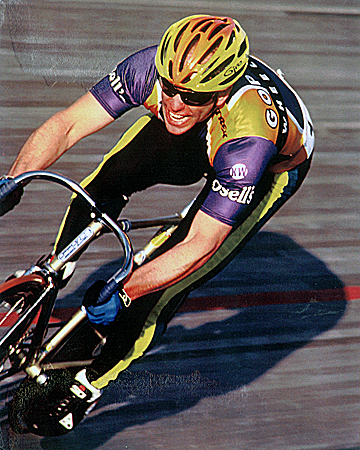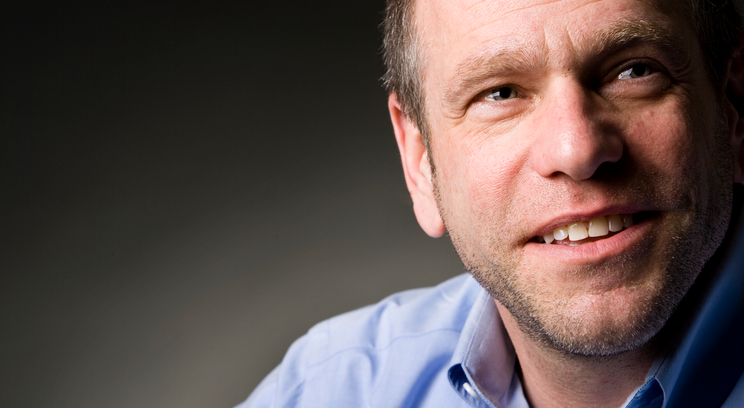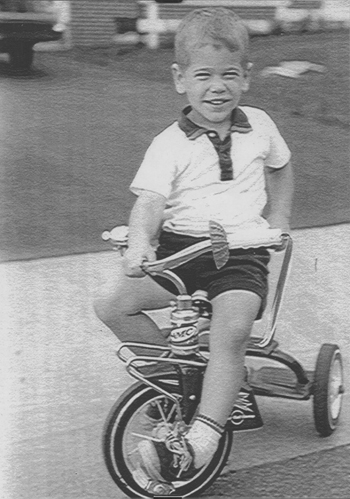Let’s ride!
“I’ve always felt that racing on the bike is a microcosm of life. There are the joys and the tragedies and the pain and the elation, and sometimes you just have to get back on the saddle."
~ John Barron
John Barron, 53, has been on a bicycle (or tricycle) most of his life – from the time he was a lad of 4 scooting around on his tricycle on the sidewalks of St. Louis Park to entering local road races as an adult to competing at the velodrome at the National Sports Center in Blaine.
He no longer races, but he’s back on the saddle as team manager of a female collegiate all-star bicycle racing team that will compete at the Nature Valley Grand Prix, which is held annually during June in Minnesota and western Wisconsin.
From trike to racing bike
An older brother raced and influenced him to ride “at a higher level.”
“He fixed up a bike for me and turned it into a racing bike,” Barron said in a recent interview. “He showed me how to ride a light, fast, skinny-tire bike, and he noticed that I was pretty good on the bike.”
The coaching he received from his brother was informal – such as how to position himself on the bike, and he offered this advice: “Just go fast.”
Barron, director of St. Thomas' Service Center, bought a used racing bike in 1988 and he began to compete. “My first race was on a course in the Minnetonka area, and it was fun. Racing is hard and it hurts, but it’s fun, too,” Barron said.
After some 100 races during a 13-year span, he stopped racing and became a Level One coach, USA Cycling's highest certification level.
“I took the classes mostly for fun but also to work with junior racers and do some casual coaching. And then I got the opportunity to manage a professional team for the Nature Valley Grand Prix in 2004. … The team wasn’t able to bring its manager, so I was the interim manager and I did a lot of the logistics and that kind of thing,” Barron said. “That was my introduction to managing a professional team at a big professional race. I had a lot fun with that, and I did that for three years in a row.”
In 2007 he was asked to help form and manage a female collegiate all-star bicycle racing team to race at the Nature Valley Grand Prix. This June will be his seventh year managing the Kowalski’s Markets Collegiate All-Stars, the team’s official title.
The Nature Valley Grand Prix, part of the Nature Valley Bicycle Festival (June 6-16), will feature six races over five days, June 12-16. The first race – the 7.7-mile St. Paul Riverfront Time Trial – will roll past the University of St. Thomas from 8:30 a.m. until about noon Wednesday, June 12, on Mississippi River Boulevard; the start line and finish line of this "race of truth" will be located just south of the Ford Bridge. Other stages of the grand prix will be held in Cannon Falls, Minneapolis and Stillwater, Minn., and Menomonie, Wis. St. Paul also will be host to a second race on June 12, the St. Paul Downtown Criterium, with races starting at 6:15 p.m.
The all-stars
Six all-stars are selected each year to compete in the grand prix based on how they finished in the USA Cycling Collegiate Road National Championships, which was held May 3-5 this year in Ogden, Utah. The goal of the program, Barron said, is “to identify otherwise relatively invisible collegiate student-athletes who are on the bike – identify them and give them an opportunity to race at the highest level."

John Barron raced for 13 years, which included a lot of races on the velodrome oval at the National Sports Center in Blaine.
"These young women are exceptional,” he added. “They are student-athletes so they have to figure out how to manage their time and their studies as well as an incredible number of hours of training on the bike."
Thirteen women in the past six years have received pro contracts. This year’s team members hail from Vermont, California, Massachusetts and Colorado.
"My job is primarily logistics,” Barron said. “Getting them here and creating an environment where all they have to worry about is getting on their bikes and racing. … It gets better and better every year, but we've got a real nice package going where it all just seems to work. Because my support staff and, indeed, the people who make this very successful race happen, are all volunteers, my job is really to make sure that everybody has fun, because these volunteers don't do it for the pay, they do it for a chance to give back to racing and to have fun.”
His duties include working with the media, coordinating with USA Cycling, working with the racers’ coaches, and arranging for housing during the grand prix and also a three-day training camp in Wisconsin that he hosts before the start of the series. His team's support staff includes a bike mechanic, a massage therapist and others who, like Barron, all raced at one time.
“Being a part of the all-star team is a chance to be a part of racing without being wheel-to-wheel. … What I get out of it is the satisfaction of sharing my knowledge and experience with others,” Barron said.
Microcosm of life
Racing, like life, can be loaded with disappointment. Often you don’t win the race. No one likes to lose, but we learn, get back on the saddle and ride forward, and we hope there is joy and elation along the way.
In the various grand prix stages, the all-stars typically are overmatched by older, more experienced elite and professional racers; still, as Barron points out, “They usually come away saying it was one of the funnest things they’ve ever done. … My racers usually come away from this week of racing saying it was just a fantastic experience. Fun. Filled with learning. Filled with meeting new people. Meeting coaches and sponsors from around the country, and traveling and connecting with people in a different part of the country – these are all opportunities.”
The bike festival also is an opportunity to raise funds for Children’s Lighthouse of Minnesota, the festival’s 2013 benefiting charity. According to the festival’s website, the nonprofit “has been working since 2009 to create the first residential children’s hospice and respite care home in the Twin Cities. The home will provide palliative care for children with conditions not responsive to curative care.”
In bicycle racing, as in life, win or lose you get back on the saddle and ride again – and sometimes it’s for those who can’t.








